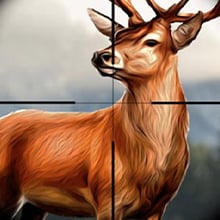
Hunting Games
Discover 20 amazing hunting games. Play for free and have fun!
About Hunting Games
What are Hunting Games?
Hunting games are a genre of video games where players simulate hunting animals in a virtual environment. These games often recreate the experience of hunting as realistically as possible. They include elements such as tracking animals, use realistic weapons, and employ various hunting techniques. The settings for these games can vary widely, from dense forests and open plains to mountains and exotic locations.
Best Characteristics of Hunting Games
Hunting games are designed to immerse players in the experience of tracking and hunting animals within virtual environments that often mimic real-world locations. The landscapes are meticulously detailed, capturing the nuances of different terrains such as dense forests, open plains, rugged mountains, and even exotic locales. The time of day, weather conditions, and seasonal changes are often simulated to add to the realism, affecting animal behavior and hunting strategies. Players must navigate these environments carefully, using the natural cover to avoid detection and employing tools like binoculars and scent masks to gain an advantage.
A hallmark of hunting games is the diversity of wildlife available to hunt. These games typically feature a wide range of animals, from small game like rabbits and birds to large game such as deer, bears, and even exotic species like lions and elephants. Each animal is designed with unique behaviors, movement patterns, and sensory capabilities, requiring players to adapt their hunting techniques. For instance, some animals might be more sensitive to noise, while others have keen eyesight or a strong sense of smell. This diversity adds depth to the gameplay, as players must learn and understand the habits of different species to successfully track and hunt them.
The hunting experience in these games is often enhanced by a realistic simulation of hunting gear and techniques. Players can choose from a variety of weapons, including rifles, shotguns, bows, and crossbows, each with its own advantages and drawbacks. The games may also feature different types of ammunition and accessories like scopes, silencers, and camouflage gear. Mastery of these tools is crucial, as players must account for factors such as wind direction, bullet drop, and the animal's movement. Additionally, hunting games often incorporate elements of strategy and skill, such as laying traps, using calls to attract animals, and tracking footprints and other signs left by animals.
Another significant aspect of hunting games is the ethical considerations they often emphasize. Many games encourage players to hunt responsibly, adhering to laws and regulations regarding hunting seasons, protected species, and the humane treatment of animals. Successful hunts are often rewarded with trophies or points, but reckless or unethical behavior can result in penalties. This focus on ethical hunting practices not only adds a layer of realism but also educates players about the importance of conservation and responsible hunting.
Overall, hunting games offer a unique blend of realism, strategy, and skill, providing players with an immersive and challenging experience. They combine the thrill of the hunt with the beauty of nature, creating a virtual experience that appeals to both avid hunters and gaming enthusiasts.



















